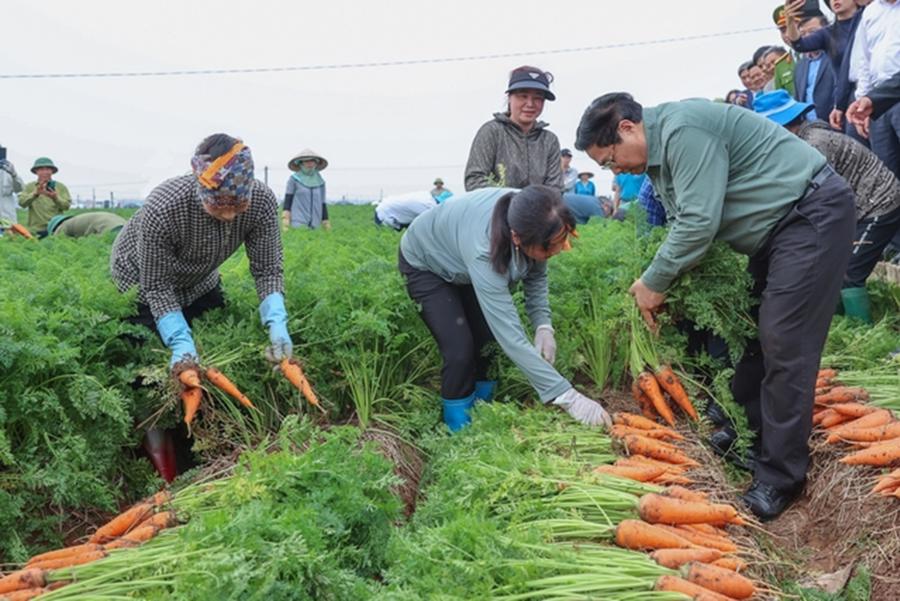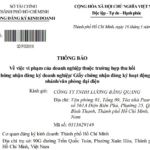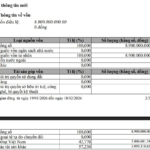Accompanied by the Minister of Agriculture and Rural Development, Le Minh Hoan, the Secretary of the Hai Duong Provincial Party Committee, Tran Duc Thang, and leaders from various ministries, departments, and localities, the Prime Minister went to the field to encourage farmers to cultivate the winter-spring rice crop in Hung Long commune, Ninh Giang district. He visited the area where tray seeding and machine-seeded paddy fields were being produced. After hearing a report on the 2024 winter-spring rice production and the application of mechanization in rice sowing, as well as the high-tech agricultural production model (footprint-free fields) in Hai Duong, the Prime Minister sat at the rice planting machine to control the rice planting process, amidst drizzling spring rain.

“Footprint-free fields” is a new model in Hai Duong where the entire production process is mechanized. In this model, machine-seeded trays are used, and seeds are sown in specialized plastic trays before they are transferred to the rice planting machine. After three years of implementing the pilot project, which was carried out by the Hai Duong Promoting Agriculture Center, as of the end of 2023, the province had sown rice on more than 1,000 hectares using the machine-seeded tray model. According to calculations, this has increased labor productivity by more than 16 times, reduced seed usage by 30%, and reduced plant protection chemical spraying by one time. Rice productivity is higher than conventional production by 2.46% to 6.91%, which has increased economic efficiency by 41.9% to 66.6% compared to non-model rice production.
Thai Long, the head of the tray-seeding and machine-seeding cooperative, said that recently, out of the five agricultural production stages, four stages have been mechanized and various machinery (such as land preparation, fertilizer application, plant protection chemical spraying, and harvesting) have been employed. The technology of machine-seeded trays has helped mechanize the remaining stage, which is rice planting, thus creating “footprint-free fields”.
Happy to receive the Prime Minister, the local residents stated that the lives of farmers and the appearance of the agricultural sector have seen significant changes in recent years. The average per capita income in Hung Long commune has been raised to VND 68.9 million per year. Farmers in Hung Long commune have also actively applied new technologies and solutions in production, such as using unmanned aerial vehicles for spraying pesticides and fertilizers.
Prime Minister Pham Minh Chinh congratulated the Thai Long tray-seeding and machine-seeding cooperative for its effective operation and the trust it has gained from the local farmers. He expressed his excitement at the increased application of technology in production, which has contributed to the restructuring of agriculture, reduced costs and heavy labor, and improved product quality and production efficiency.
The Prime Minister emphasized the need to promote the industrialization of agricultural production and suggested the establishment of specialized cooperatives (specializing in each stage of production) and cooperation, supporting farmers, and developing the sharing economy. He also called for a change in thinking and working methods, actively applying scientific and technological advancements, and investing in infrastructure development to reduce logistics costs.
The Prime Minister requested that grassroots-level authorities continuously monitor and have a good grasp of the situation, proactively and actively support farmers with their jurisdiction. For matters beyond their jurisdiction, they should report to the competent authorities for consideration and decision-making, actively collaborating with farmers to propose policies based on practical needs.
Regarding the current obstacles of the Thai Long tray-seeding and machine-seeding cooperative, as it has not been allocated agricultural land and has to rent and borrow land, the Prime Minister suggested that research institutes address this issue and provide suitable land for the new cultivation model.
The Prime Minister recommended allocating 5-10% of the rice growing area for machine-seeded tray cultivation and then planting rice on the same tray-seeded area. Local authorities need to study appropriate support measures and apply public-private cooperation in the spirit of harmonizing interests and sharing risks.
THE PRIME MINISTER SHARES JOY WITH SPECIALTY CARROT FARMERS
Subsequently, the Prime Minister and the delegation visited the area specializing in exporting carrots; and visited the Duc Chinh Cooperative, which is involved in the preliminary processing and packaging of carrots. They attended the celebration ceremony for the first shipment of carrots in the Year of the Rat to South Korea, Japan, Europe, in Duc Chinh commune, Cam Giang district. After hearing a report on carrot production and consumption, the Prime Minister talked to and encouraged the farmers, and harvested carrots with them.

Duc Chinh commune has a natural land area of 719.17 hectares. Out of this, approximately 360 hectares are used to grow carrots, with a production volume of 15,000 tons. In addition to local production, farmers in Duc Chinh commune also rent land to grow carrots in Bac Ninh, Thai Binh, Hung Yen, etc., with an overall area of about 1,100 hectares and a production volume of 45,000 tons per year. All carrots grown in the commune and in other locations are brought to the local plant for processing, sorting, packaging, and for export and domestic consumption.
By personally going to the field to harvest carrots with the farmers, talking to them, encouraging them, and cutting the ribbon to celebrate the first shipment of carrots in the Year of the Rat 2024 to countries such as South Korea, Japan, and Europe, the Prime Minister praised the carrot production, processing, and export model in Duc Chinh commune.
The Prime Minister suggested that it is necessary to invest more in deep processing and automation to improve quality, reduce costs, and increase competitiveness of the products. He advised that cooperative members can take additional loans with the support of banks, and that provincial, district, and commune authorities actively participate in supporting the people, businesses, and cooperatives more, building larger and more modern factories with higher technology, diversifying markets, diversifying products, diversifying supply chains, and greening and digitizing production.
In the Prime Minister’s opinion, Hai Duong province has potential and strengths in agricultural development, especially in cultivation. He requested that Hai Duong province focus on transforming and developing major crops with high economic value and concentrated commodity production to meet market demand.
The Prime Minister emphasized the need to build brands, promote and boost trade; develop raw material areas; actively invite and connect businesses to participate in production, processing, and marketing of products for the people; promote links between farmers, businesses, banks, and scientists and researchers with the support of the state to connect production with processing, consumption, and promote stable, green, and sustainable agricultural development, helping farmers prosper on their homeland.
The Prime Minister highly appreciated Hai Duong province for its emphasis on and leading role in the mechanization of agricultural production in the Red River Delta region, where most stages of production have already been mechanized.
The Prime Minister expressed his desire for Hai Duong province to continue to promote mechanization in all stages of agricultural production, and to implement measures to promote the construction of new rural areas and national target programs, aiming to make the province an ecologically friendly, modern rural area with civilized farmers.












